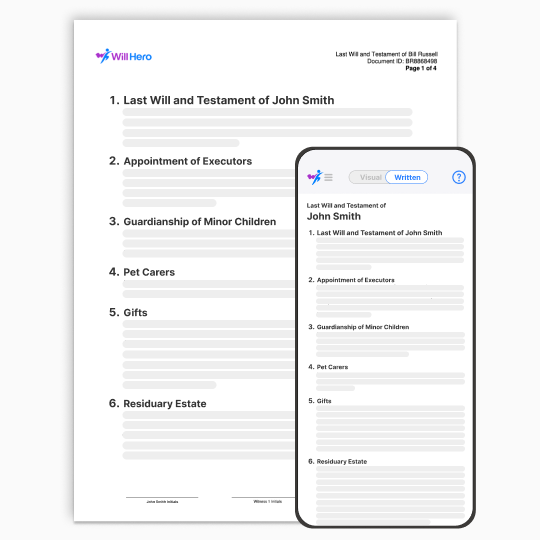
Does a Spouse Automatically Inherit Everything in Australia?
Understanding Australian Spousal Inheritance: Laws, Limits, and Common Misconceptions.
In Australia, many people assume that if they pass away, their spouse (or de facto partner) will automatically inherit everything. However, the reality can be quite different. Inheritance laws vary between states and territories, and factors like whether you have a valid Will, children from previous relationships, or significant assets outside the estate (such as superannuation) can dramatically influence the outcome.
Let’s explore whether a spouse automatically inherits everything in Australia, how intestacy (dying without a Will) laws work, and why estate planning is essential for ensuring your wishes are carried out.
The Short Answer ... Not Necessarily
While it is common for people to leave the bulk of their estate to a spouse, Australia’s inheritance laws do not guarantee that a spouse always receives the entire estate. The distribution depends on several factors:
- Whether there is a valid Will or estate plan in place.
- The presence of children or other family members who may have legal claims.
- The nature of your marital or de facto relationship.
- Ownership structures for major assets (e.g., property held in joint tenancy).
Common Influences on Distribution
- Valid Will – If a legally valid Will names the spouse as the sole beneficiary, then the spouse inherits everything under that Will.
- Intestacy Laws – If there is no valid Will, each state’s intestacy rules dictate how the estate is divided.
- Blended Families – If there are children from previous relationships, the spouse’s share can be reduced under intestacy or even under the Will if it’s contested.
- Jointly Owned Property – Assets held as joint tenants may pass automatically to the surviving joint owner, bypassing the estate.
What Happens If There Is No Will or Trust? (Intestacy)
Defining Intestacy
Intestacy means dying without a valid Will or Trust in place. When this happens, each Australian state or territory has default rules that determine who inherits your assets. These laws aim to distribute the estate in a manner considered “fair” according to legal definitions, but it may not reflect the deceased’s personal wishes.
Spouse and Children’s Entitlements
Under intestacy, a spouse (including a legally recognized de facto partner) is generally the first in line to inherit. However, the share of the estate a spouse receives can vary significantly depending on:
- Whether there are children from the current relationship only.
- Whether there are children from a previous relationship (who are not the spouse’s children).
- Whether there are living parents, siblings, or other relatives in some states.
For instance, in certain states, if all children of the deceased are also the children of the spouse, the spouse may inherit the entire estate. But if the deceased had children from a previous relationship, then the estate is often split between the spouse and those children.
State-by-State Overview of Intestacy Rules
Because each state and territory legislates its own intestacy rules, it’s important to understand the general frameworks. Below is a brief summary, but keep in mind that specific entitlements can change over time, so always check the latest legislation or consult a lawyer.

New South Wales (NSW)
Governing law: Succession Act 2006 (NSW)
Key Point:
- If the deceased leaves a spouse and no children, the spouse inherits the entire estate.
- If there are children from a prior relationship, the spouse may receive a statutory legacy (a set amount adjusted for inflation), personal effects (chattels), and a share of the remainder of the estate. The children inherit the balance.

Victoria (VIC)
Governing law: Administration and Probate Act 1958 (VIC)
Key Point:
- If the deceased’s children are all from the spouse, then the spouse inherits everything.
- If the deceased has children from a different partner, the spouse receives a statutory legacy plus part of the residue, while the children receive the remaining share.

Queensland (QLD)
Governing law: Succession Act 1981 (QLD)
Key Point:
- In many cases, the spouse inherits household chattels, a statutory legacy, and part of the residual estate.
- If there are no children, the spouse usually inherits everything.

Western Australia (WA)
Governing law: Administration Act 1903 (WA)
Key Point:
- The spouse’s share depends on whether there are children, parents, siblings, or half-siblings.
- If there are children, the spouse often receives a fixed sum plus a portion of the remainder, while children receive the rest.

South Australia (SA)
Governing law: Administration and Probate Act 1919 (SA)
Key Point:
- Similar to other states, there is a statutory legacy for the spouse if children exist.
- If no children exist, the spouse may inherit the entire estate, possibly shared with parents or siblings under certain conditions.

Tasmania (TAS)
Governing law: Intestacy Act 2010 (TAS)
Key Point:
- The spouse typically gets all personal effects and a portion of the estate if children or parents exist.
- Where there are no children or parents, the spouse may inherit everything.

Australian Capital Territory (ACT)
Governing law: Administration and Probate Act 1929 (ACT)
Key Point:
- If there are no children, the spouse usually inherits the entire estate.
- If children exist, the spouse’s share is governed by a statutory formula.

Northern Territory (NT)
Governing law: Administration and Probate Act 1969 (NT)
Key Point:
- The distribution formula involves a statutory legacy for the spouse and a share of the balance if there are children.
- If there are no children, but there are parents or siblings, they may also receive a share of the estate.
A Note on Statutory Legacies
In several states (e.g., NSW, VIC, QLD, SA, WA), a statutory legacy is payable to the spouse if the deceased leaves children from a previous relationship. These amounts are indexed over time. For example, in NSW, the statutory legacy is currently set at around A$480,000 (plus CPI adjustments) and is subject to periodic change. Always check your state’s current legislation or consult a lawyer for the exact figure.
Special Considerations
De Facto Partnerships
In most Australian jurisdictions, de facto partners have similar rights to legally married spouses if the relationship meets certain criteria (e.g., living together continuously for a specified period, registering the relationship in some states, or having a child together). However, proving a de facto relationship can become complicated if there is a dispute, so it’s prudent to formalise your wishes in a Will.
Blended Families
In blended families, stepchildren and children from previous relationships often introduce additional complexity. Unless legally adopted, stepchildren are generally not considered direct beneficiaries under intestacy laws. If you wish to provide for a stepchild, you need a valid Will or another estate planning instrument.
Jointly Owned Property
Any property or bank accounts held as joint tenants automatically pass to the surviving joint owner, irrespective of what a Will or intestacy law states. This means if your spouse is a joint owner, that property typically won’t be part of the estate for distribution.
Superannuation and Life Insurance
Superannuation and life insurance proceeds often fall outside the estate. Many super funds require a binding nomination or will have trustee discretion to pay benefits to dependent beneficiaries. If your spouse is your nominated beneficiary, they usually receive these proceeds directly, bypassing the Will.
Separation vs Divorce
If you are separated from your spouse but not legally divorced, Australian law generally still treats you as legally married for inheritance purposes. This means:
- Informal separation alone does not extinguish your spouse’s rights under intestacy or an existing Will.
- A formal divorce or a binding financial settlement (approved by a court) typically cuts off a spouse’s inheritance rights under intestacy. Also, a divorce will often invalidate parts of a Will that name the (ex-)spouse as a beneficiary, depending on the state’s legislation.
For people in prolonged separation, it’s important to formalise your arrangements either by finalising a divorce or making a new Will that reflects your current wishes.
What Happens If There Is a Will?
A valid Will provides the most reliable way to ensure your spouse inherits what you want them to inherit. By creating (and regularly updating) a Will, you can:
- Name your beneficiaries – clearly state who gets what, including specific gifts to your spouse.
- Appoint an executor – choose a trusted person to administer your estate.
- Minimize disputes – avoid disagreements about how your assets should be divided.
Clarify entitlements – particularly important if you have a blended family or wish to provide for stepchildren.
Contesting a Will
Even if you have a valid Will, Australian law allows eligible persons (such as spouses, de facto partners, children, and sometimes other dependants) to contest the Will if they believe they have not been adequately provided for. This can lead to legal proceedings, so it’s important to seek legal advice if your family situation is complex or if you anticipate potential disputes.
Why Estate Planning Matters
Common Pitfalls of No Estate Plan
- Unintended outcomes: If there’s no Will, intestacy laws apply automatically, which may not align with your personal wishes.
- Family disagreements: Survivors can face conflicts over distribution, leading to stress and even costly legal battles.
- Delay in administration: Settling an intestate estate often takes longer, as additional legal processes are required to identify beneficiaries.
Estate Planning Options
- Wills: The cornerstone of any estate plan.
- Trusts: Can be set up for asset protection or to provide for beneficiaries (e.g., minors or vulnerable family members).
- Binding Financial Agreements: Sometimes used in conjunction with Wills for blended families.
Binding Death Benefit Nominations: For superannuation funds, ensuring that the right person receives your super directly.
Regular Updates
Estate planning is not a “set and forget” exercise. Major life events such as marriage, separation, the birth of a child, or the acquisition of significant assets should prompt a review and update of your Will.
Frequently Asked Questions (FAQs)
Q1: Does a spouse automatically inherit everything in Australia?
A1: Not always. It depends on the existence of a valid Will, the nature of the relationship, and whether there are children (particularly from previous relationships). In many cases, a spouse inherits a substantial portion, but not necessarily all.
Q2: What if we’re in a de facto relationship and not legally married?
A2: De facto partners can have similar entitlements as married spouses in most states, but you need to demonstrate that your relationship meets certain criteria. If you want to ensure your partner inherits specific assets, having a valid Will is strongly recommended.
Q3: Do stepchildren automatically receive a share if there is no Will?
A3: Generally, no, unless they were legally adopted. Stepchildren are often not included under intestacy laws. To provide for them, you should create a Will or trust explicitly naming them.
Q4: Who inherits my superannuation and life insurance?
A4: Superannuation and life insurance benefits typically lie outside your estate. If you have a binding nomination in place, the funds will go directly to the nominated beneficiary, often the spouse.
Summary
In summary, a spouse does not automatically inherit everything in Australia. The distribution of a deceased person’s estate depends on whether there is a valid Will, the intestacy rules in each state/territory, and other important factors such as the presence of children from previous relationships. Having a carefully drafted and regularly updated Will is the simplest way to ensure your spouse inherits what you intend.
Need Help with Estate Planning?
At Will Hero Australia, our mission is to empower individuals and families with the knowledge and tools to protect their interests. If you’re unsure about your estate plan or want to draft a legally sound Will, reach out to our team or consult a qualified legal professional in your state.
Will Hero Australia is dedicated to offering clear, straightforward information about wills, trusts, and estate planning. Our goal is to remove confusion, help you understand the laws in your state, and ultimately protect those you love.

Disclaimer: This blog provides general information only and does not constitute personalised legal advice.